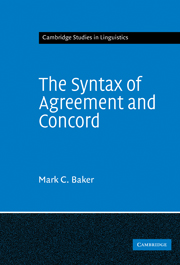Book contents
- Frontmatter
- Contents
- Acknowledgments
- List of abbreviations and conventions
- 1 Introduction: category distinctions as a window on the theory of agreement
- 2 Basic agreement and category distinctions
- 3 The unity of verbal and adjectival agreement
- 4 Explaining the restriction on person agreement
- 5 Parameters of agreement
- Appendix: Table of languages and their agreement properties
- References
- Index
1 - Introduction: category distinctions as a window on the theory of agreement
Published online by Cambridge University Press: 12 January 2010
- Frontmatter
- Contents
- Acknowledgments
- List of abbreviations and conventions
- 1 Introduction: category distinctions as a window on the theory of agreement
- 2 Basic agreement and category distinctions
- 3 The unity of verbal and adjectival agreement
- 4 Explaining the restriction on person agreement
- 5 Parameters of agreement
- Appendix: Table of languages and their agreement properties
- References
- Index
Summary
A generalization to be explained
Even though agreement phenomena are some of the most familiar and well-studied aspects of grammar, there are certain basic questions that have rarely been asked, let alone answered. One such question concerns the fact that, in many languages, the three major lexical categories – noun, verb, and adjective – behave quite differently with respect to agreement. Words of all three categories can bear similar, even cognate, inflectional affixes. But verbs are consistently the most prolific agreers, often agreeing with their subjects in person, number, and gender features, and sometimes agreeing with their objects in these features as well. Adjectives clearly participate in agreement, but they do so more modestly: they rarely or never agree with more than a single nominal, and they can agree in number and gender but they typically do not show first or second person agreement forms. In light of these differences, traditional grammar often says that adjectives participate in concord, a distinct phenomenon from the agreement that involves verbs. Nouns are more conservative still. Although they are often inflected, sometimes with the same affixes that adjectives take, nouns do not need to agree with another NP in their environment the way that an adjective in a similar structural configuration does. My thesis in this book is that the true theory of agreement should be able to explain these robust cross-categorial differences, and that much can be learned about agreement by seeking a theory that meets this condition.
To illustrate the fundamental contrasts in agreement behavior that I have in mind, consider (1) from Swahili.
- Type
- Chapter
- Information
- The Syntax of Agreement and Concord , pp. 1 - 11Publisher: Cambridge University PressPrint publication year: 2008



